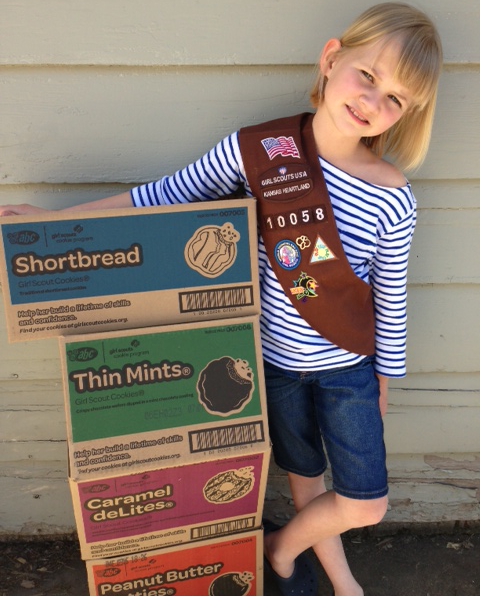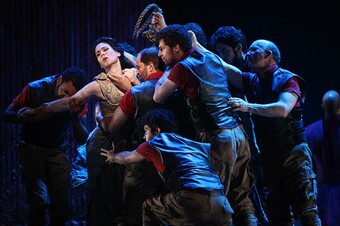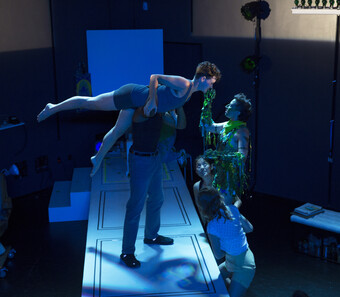Parenting and Playwriting
The Boyfriend Plot
This post is part of a regular series on Parenting & Playwriting. If you have a topic you’d like me to address, contact me at [email protected].
I made Lizzie join the Girl Scouts this year, because she needed to work on her social skills (aka acquire some), and the Girl Scouts seemed like a well-organized, low pressure situation in which to practice the more social of her graces. But I have to be honest: modern "scouting" is kind of lame. At meetings, the girls recite pledges, form friendship circles, and acquire badges for dubious wilderness skills like "playing fair" and "helping others." I hear the older girls, the Juniors, will go camping this spring, but so far, the only camping my little Brownie has done took place at a lock-in at the mall.

I quite like Lizzie's troop leader, though. She's a wry and well-organized lady (the two best qualities in any leader of extracurricular activities for children, if you ask me). So when she asked me to lead the troop in storytelling exercises one afternoon, I readily agreed. Like many playwrights, I've done my time in the public schools of America teaching playwriting to students of all ages, and although it's been awhile, I located my teaching artist files in a box in the basement and blew off the dust.
I am, nonetheless, deeply dismayed that the collective imagination of a group of girls, ages seven to ten, would land so squarely in the middle of the boyfriend plot with so few outliers. I don't blame the girls, however; I blame us. The storytellers. We are failing to model stories about girls that do not involve boyfriends.
I began with some basic exercises. We played "hot potato story," where whomever catches the ball has to contribute a line or two to an ongoing story. I laid out photographs depicting various intriguing people from which they devised characters. They sketched bios, did lightning interviews, and finally I had them write letters from the point of view of the character, which we then turned into monologues. Standard creative drama stuff.
The girls were terrific. Silly and shy, coy and rambunctious, attention-seeking, wise beyond their years, strikingly immature, they strutted about the room like little heroines in a post-modern novella written by Louisa May Alcott, edited by Ntozake Shange, with contributions from Beyoncé—the Destiny's Child years. Their monologues, however, were a disappointment. Not because they were poorly written or lacking in style or stingy with words, but because only one girl wrote a monologue that wasn't about getting a boyfriend, keeping a boyfriend, or losing a boyfriend.
Before I get on my high horse, let me say, some of the best literature in the world is about getting, keeping, or losing a boyfriend. I'd put Jane Austen head-to-head with Dickens any day; she has him beat on psychological complexity hands-down. And don't get me started on Middlemarch. In Dorothea's marriage to Mr. Casaubon, George Eliot dissects then eviscerates the role of delusion in romantic love like a Triple Crown thoroughbred. Furthermore, I recognize that human sexuality does not magically ignite at age eleven. If what I felt for Ricky Schroeder in the third grade was not lust, I don't know what is. Heartland Girl Scout Troop 10005890210 is neither shallow nor sexually precocious.
I am, nonetheless, deeply dismayed that the collective imagination of a group of girls, ages seven to ten, would land so squarely in the middle of the boyfriend plot with so few outliers. I don't blame the girls, however; I blame us. The storytellers. We are failing to model stories about girls that do not involve boyfriends. Yes, Anna saves her sister, Elsa in Frozen; and yes, Merida reconciles with Mother in Brave; and indeed, Angelina Jolie wakes Sleeping Beauty in Maleficent with her larger than life, pouty lips. But if you look closely, all of these stories still hinge on the boyfriend plot to propel the action: Anna becomes infatuated with Hans; Merida must choose between suitors; Angelina Jolie is betrayed by a no-name actor with thin lips. In fact, when I survey the big, commercialized myths we're selling to our daughters in the marketplace of storytelling, the so-called "progress" we've made feels thin.
Where are the big stories about girls who want to live on the moon? Full stop. Who have to save their younger brothers from the orphan train? Full stop. Who want to juggle flaming swords on the stage, slay dragons for the mere thrill of slaying dragons, and topple giants, full stop, regardless of finding, keeping, or losing their boyfriends? I know there are more stories out there than what's hitting the multiplex cinema, but they can easily get lost in all the chatter and buzz.
What stories are you telling your girls? What should Lizzie, Laura, and troop 1005890210 be watching and reading? Let the comments fill to the brim with your recommendations!
Finally, who was the one Girl Scout to reject the boyfriend plot, you may be wondering? Yes, it was my Lizzie. Of course, her monologue was about a girl who wanted to kill her mother, so it was more of a half-win.









Comments
The article is just the start of the conversation—we want to know what you think about this subject, too! HowlRound is a space for knowledge-sharing, and we welcome spirited, thoughtful, and on-topic dialogue. Find our full comments policy here
In order to get the literary world to achieve the goals spoken of in this article we need to adopt asexual reproduction. Aldous Huxley wrote about that world. The question is: does anyone want to live there?
MUST READ: Girls to the Rescue. Excellent stories that show hard-working, clever, ambitious girls doing wonderful things. They are polite but not subservient, they don't rely on their beauty. They act on Kindness, Strength, and Love (not just romantic love). Here's a link!: http://www.amazon.com/Girls...
In terms of movies, my favorite movie growing up (and one which I still return to regularly) was The Last Unicorn. There is a romance component that comes into the story in the second act, but it's much more complex than mooning about looking for a boyfriend (and it's the man who does any mooning). And there's a strong male-female friendship in Schmendrick and Molly. I liked Mulan, which, even though it again has a romance, is really about a girl becoming a hero to save her country and her father, not to get a boy to like her. Oh! Oh! Whale Rider! No romance, just an amazing young female protagonist. One of my favorite movies.
In terms of books, I remember enjoying The Blue Sword by Robin McKinley, about a woman who becomes a warrior in a desert tribe. I also second another commenter's recommendation of Island of the Blue Dolphins. I read that well over a dozen times.
There is great theatre for the 8+ year old out there that goes beyond the boyfriend plot...dare I say most of it is being made overseas? I've been representing theatre for young audience performing artists in addition to others the last 5 years and am a regular attendee at IPAY (International Performing Arts for Youth) where companies from the US and elsewhere submit a full tour ready piece to showcase in its entirety on a stage in front of us industry folk. The best work is coming from Australia and Europe where the piece is about youth who are grappling with issues, or telling a tale of a cultural event through the eyes of a 10 year old, or a reimagining of a Greek myth where boys and girls leave wanting to on an adventure. It is not Cinderella...it's not Seussical the Musical...or Angelina Ballerina. It isn't a book based play to tie into the core or anything particularly pop culture related. The overseas companies though have incredible funding from their governments to create and tour the work and value arts for young people and arts education very differently. So it means they have money to take risks, not worry about butts in seats, or a curriculum tie in.
I scour the international children's festivals - Philadelphia, Pittsburgh, Cleveland (Playhouse Square), Minneapolis (Ordway), Dayton (Victoria Theatre), and tons of Canadian ones, as well as what the New Victory Theatre in NYC programs...you may run into a few Knuffle Bunny plays but for the most part, you will find some amazing cutting edge programming for babies through high school. I have a 7 yr old son and nieces who range from 5-13. I'm in Philadelphia - Annenberg runs a festival in April/May so between that and our New Vic membership, we are golden. He just started reading this year so things remain to be seen on the book front.
Great to hear from you, Chrissie. Really appreciate your perspective.
Whatever is wrong with girls talking about boyfriends and boys talking about girlfriends? Isn't that how our species is preserved? I would rather by girls talked about boyfriends than about dragons. let them learn to nurture the young than fight in the military.
boys don't talk about girlfriends. they talk about saving the world.
Sure, boys don't bother about girlfriends UNTIL they hit puberty, when their hormones kick in and all they think about is how to impress some girl.
Why in the world can't we simply allow our kids to grow up naturally, with guidance from us? Why must we force what they think about? Fact is, if their thought process is natural, we really can't do much about it; we'll only delay the inevitable. If it is social conditioning, they will soon grow out of it.
Let's just love them and support them, only intervening when they begin to go astray. Boys are not girls and girls are not boys, otherwise we won't have to put them in two categories (i.e. Boys, Girls). Again, both are valuable but still different--like your eyes and ears for example. Not equal but equally valuable. Why is that too difficult to understand?
The species won't be endangered if we give girls other templates of thought other than seeing themselves validated only in a relationship.
That is just the way girls are. A ten year old boy would tell of flying a space craft or shooting a wild hog.
Many good books here: http://www.amightygirl.com/...
"Island of the Blue Dolphins" by Scott O'Dell is great.
A Wrinkle in Time and most of Madeleine L'Engle's books are must reads for young girls. The boyfriend comes later on but it's very subtle. Meg is a great character for girls who feel awkward during the tween/teenage years. She was one of my biggest role models.
I agree with this almost completely, but did want to point out that the point of Brave is that Merida's society tells her she needs to pick a suitor, but she finds her own agency and rejects the boyfriend narrative.
Without too clear a memory on ages, some thoughts that I haven't seen yet in the comments: Half Magic series, Un Lun Dun, Alice in Wonderland, 5 Children and It, Circle of Magic quartet, So You Want To Be A Wizard (there's a hint of boyfriend stuff late in the series when they get older), Narnia, Coraline (warning: scary), the Unicorn Chronicles, Cam Jansen mysteries, Caddie Woodlawn, Afternoon of the Elves
The films of Hayao Miyazaki and Studio Ghibli, especially Spirited Away, Princess Mononoke, Ponyo, My Neighbor Totoro, Arrietty, and Isao Takahata's recent The Tale of Princess Kaguya. These are treasures.
So glad you wrote this! We're just starting to struggle with strong female characters for our 4 year old daughter who has become obsessed with "Frozen" (but I did notice the romantic storyline and it bugged me). We're giving her Princess Black for her birthday though we've never read it. It's about a princess who is also a superhero on the sly. My son is older and so we know about books like Magic Treehouse and Bing and Golly. But it's so frustrating that we need to pick through things to make sure everyone's well-rounded.
Teaching her math rather than false confidence will get her further in life. Though if you want to have grand-kids raised in a happy home you aren't going to improve upon the time-tested curriculum
The Magic Tree House books, by Mary Pope Osborne, all tell the story of a brother and sister who time travel and solve problems collaboratively. No boyfriends in sight. While the first 28 books might skew a little young for your group (ages 6-8,) the next set, the Merlin Missions, aim for ages 7 to 10 or so. And a recent Super Edition book, Danger in the Darkest Hour (about a mission in Nazi-occupied France during WWII,) skews higher than that.
I'm not a parent, so I don't know the exact ages when these become appropriate, but they're what made a great impression on me as a kid (books and film): Dealing With Dragons, the Laura Ingalls Wilder Series (only get boyfriend plots 6 or so books in), A League of Their Own, A Wrinkle in Time, The Wizard of Oz, The Westing Game, Ronia the Robber's Daughter. Then, a lot of biographies (there are good editions for kids): Eleanor Roosevelt, Elizabeth the First, Harriet Tubman.
Of course, most of the books that aren't about a boyfriend plot are about being devoted to your family - a good daughter/sister etc. Possibly a public servant. Which is a whole other topic. This is part of why I love A League of Their Own. It is one of the very few stories I found as a childhood that is about women in unabashed pursuit of greatness.
Thanks for bringing up "The Westing Game"-- I keep meaning to check that one out.
So good! An interesting test for me is always, "do boys also like it?" That to me is one of the signs that we're telling girls the same kind of story we tell boys. It almost never happens!
Must boys like what girls like? Aren't boys and girls different in every single cell of their bodies? Their anatomies, their bone structure, their brains, their emotions and even their physiologies are different. Why fight against nature? Why waste so much effort trying to pump the water upstream?
No, we're not different in every cell of our bodies. We're actually almost identical in every cell of our bodies. Neurocience as yet has not in any way determined what brain differences exist between men and women, but, if anything, most contemporary neuroscience indicates that the brain is very plastic - what may become stark differences in adults are more likely to result from experiences as a child than from any inherent biology (this is why people with the exact same biological risk factors for addiction or mental illness can have vastly different outcomes based on their life circumstances). so, any differences between the genders that you observe are very likely to stem from the fact that we are handing girls different books, showing them different role models, and telling them different things from the second they're born - and I for one feel that we're telling them worse things, and should give them a shot at being the fully confident, self-actualized people they could be.
Really? For girls, every cell in her body carries 2 copies of the X chromosomes, one of which may be inactivated. For boys, each cell carries the XY chromosomes, both of which are active. Unless X and Y chromosomes are exactly the same, then males and females are different in every cell of their bodies. You might as well say Audi and BMW are exactly the same because they are both luxury cars, and you'd be wrong.
Hmm... but based on your comment what if one my sisters and I get the same X chromosome (very likely that I share one since I have 3 sisters). Shouldn't we spend exactly the same amount of time talking about the boyfriend plot?
"The girl who circumnavigated fairyland in a vessel of her own making" is amazing. I also loved "Summer and Bird" and "Jennifer, Hecate, Macbeth, William McKinley, and me, Elizabeth".
I've been amazed by the variety that's out there. We're living in a great time, we just have to help get these stories into kids hands.
I don't know any of these. Thanks for the recs!
try my middle readers. girl protagonist, adventure stories, no boyfriend in sight.
First one Coyote Summer, out last april. Next one is The Ghost/Thief Summer. just went to the sditor. check out my page for more info- margosolod.com
Will look them up! Thanks, Margo.
ask your library to order from Brandylane Publishing if you like what you see on website but don't want to buy one.
"Gwinna" by Barbara Helen Berger is one of my all-time favorites – about a girl with wings who goes on a quest to find the source of the music she hears in the wind, makes friends with a tree and finds her own voice. Somebody should do a stage adaptation sometime, it could be incredible.
The original Oz books by L. Frank Baum are another thing I always think of for this kind of question – all 15 of them are weird and wonderful and, if I recall correctly, persistently avoid any Boyfriend Plots!
I just adapted OZ for the stage, actually, so it's been stuck in my mind, but I've never heard of "Gwinna." Will definitely check that one out.
Tried to think of age-appropriate books about girls sans romance and could only come up with Dealing with Dragons, Harriet the Spy, and From the Mixed-Up Files of Mrs. Basil E Frankweiler. Maybe there are lots of new ones I've never heard of.
Oh I love the Mixed up Files! It is so good. I'll have to look up Dealing with Dragons--never heard of it.
I also highly recommend the "Dealing with Dragons" series by Patricia C. Wrede. There are four books in the series, "Dealing ... " being the first one. A romance does develop later but it's definitely not the main focus. They're funny and smart. Marvelous language. Publisher describes them as YA but my daughters loved them in elementary school. I loved reading them aloud and my younger one was only six when she listed them as her favorite books. Another feminist fantasy writer loved by all the smart, literate young women I know - beginning in elementary school and continuing into adulthood - is Tamora Pierce. She's written a whole slew of different series appropriate for different age levels. Some of them involve romance, some don't, but all have strong female protagonists and compelling plots. My nephews liked them too.
Yes, Tamora Pierce! I reread some of them as an adult and was blown away by just *how* feminist all of those books are.
I'm also remembering Karen Cushman's excellent historical fiction (Catherine, Called Birdy!) and The True Confessions of Charlotte Doyle, which might be a little violent for 7-10 year olds, but which definitely made me want to go live on a boat.
I second Tamora Pierce! Her Alanna books were my favorite as a kid, but it only recently occurred to me what an awesome role model she was. There is a bit of romance, but the best part about the Alanna series is that she chooses the man who actually supports her ambitions rather than the one who wants her to come second to his.
We are producing Pippi Longstocking right now- and I have had several discussions with my actress (a 28 year old) who is playing Pippi and has played many red-headed heroines in the Theater for Young Audience Genre- including Anne of Green Gables and Freckleface Strawberry- and she brought up that this is the first red-headed, freckled girl she has played that doesn't dislike her appearance- Pippi is strong, independent and sees the world differently, and while the world tries to make her fit into a bubble- she always succeeds when she listens to her own heart.
That's fascinating about the red head phenom. Lizzie was Pippi for Halloween this year. Big Pippi fan.
My 9-year-old likes Ivy & Bean (best friends who get in a variety of trouble together, not including boyfriends), The Mysterious Benedict Society (a group of male & female child geniuses who are best pals and have to save the world, repeatedly), The Guardians of Ga'hoole series (more danger and world-saving) and anything with vampires and/or werewolves (no Twilight--she's too young and that is the Ultimate Boyfriend Narrative, is it not?). Favorite movies include The Incredibles and Cloudy With A Chance of Meatballs 2. She loves the cartoon Phineas & Ferb, which is a charming show EXCEPT for the idiot sister Candace whose twin obsessions are her boyfriend Jeremy and getting her brothers in trouble (she has no success with either the boyfriend nor the trouble project--she's entirely lame). It's hard to stay off the damsel-in-distress track, but there's stuff out there. I was surprised by her take on Cinderella: at 4 she told me Cinderella was the bravest princess because she went to a party alone and wasn't shy and had a good time. Which isn't a bad social skill to have!
Yes, we like Ivy and Bean too! We'll have to check out the others!
My daughter is 29 years old and has a very successful new career in the fashion industry. What does she want that she doesn't have? A boyfriend. So, guess what - I'm writing a play about this because it is interesting that we've come so far but still and all when a young woman or girl wants male companionship it's a real thing. And since she is also successful in her work, in a fairly glamorous and difficult business, she's kind of on the moon, slayed the dragon, juggled some flaming swords - but she still wants a boyfriend.
It's certainly a primal impulse for many of us...just hate to see it emphasized so much and so early!
I am happy to know that your daughter is a normal, functioning individual. We can try to deny biology all we want but we won't ever win. Biology predates us, and will outlast us. We had better get in line, and do its bidding. Everything else is an exercise in futility.
http://bookriot.com/2015/03... Especially intrigued by the Wollestonecraft Detective Agency.....
Hi, Valerie. Thanks for sharing this list. I see the "Zita, the Space Girl" graphic novel series on it. We gave these books as a gift to a friend's 7-year-old daughter and fell in love with them ourselves. Can't wait for new ones to come out. Beautiful art.
I just had this conversation on FB! My question was where are the stories about boys and girls being friends - rather than love objects. Why no "bromances" where it's a girl and a boy tackling a task together? (Especially because I have a girl and a boy child...) Great piece!
Harry Potter, until the last book or so, is a great mixed gender friendship. Even then, Harry and hermione never hook up.
What stuff did people recommend? AND I know I owe you an email!!!
The Magic Tree House is a great one for kids: Jack and Annie
Bridge to Terabithia is a great non-romance boy/girl friendship story, but it's very sad!
I welcome new narratives for girls (and boys, but that's another discussion) but, as you noted, all is not lost because a young girl wants to tell a story about a boyfriend. If that's what's around them, of course that's what they'll want to figure out in their own imagination. And that's empowering. That's also an opportunity to listen to girls and what they're struggling with.
I appreciate HowlRound for keeping me current on consequential and thorny issues in theater, but then there are also pieces like this -- which also does those things, and is smart and thought-provoking besides, not to mention absolutely right -- but on top of all that is just a great, great read.